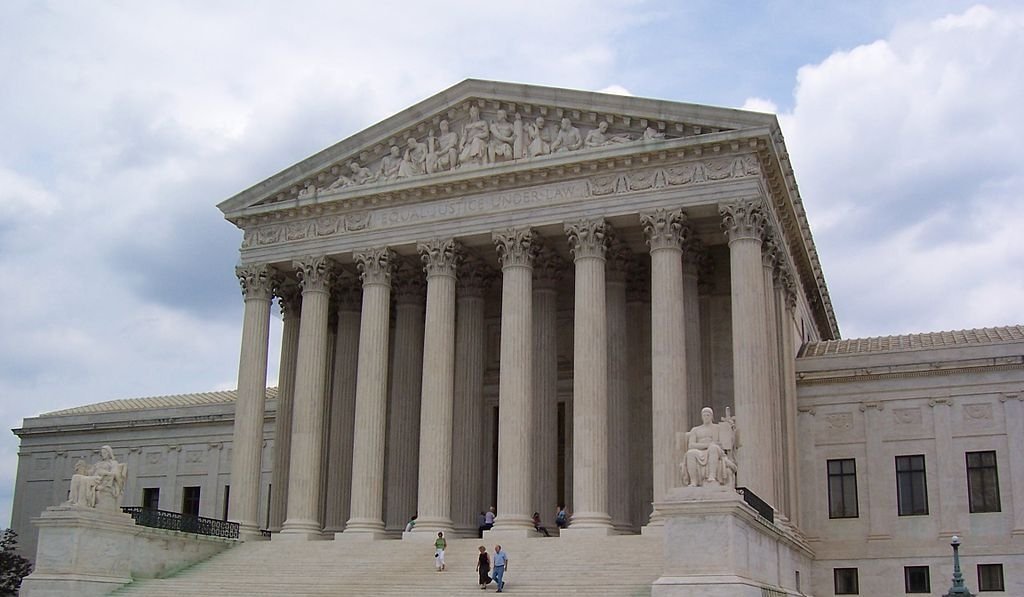Free Press Goes to the Supreme Court

Original photo via Wikipedia
This morning, Free Press went to the Supreme Court — well, to the highest virtual court in the land, with the pandemic forcing the justices to dial in by phone — for oral arguments in Prometheus Radio Project v. FCC.
This case is the culmination of our long-running challenge to the FCC for repeatedly trying to dismantle media-ownership limits while failing to study the impact on broadcast-ownership opportunities for women and people of color.
On one side: the Trump FCC and its backers at the National Association of Broadcasters.
On the other: Free Press and its allies at Prometheus Radio Project, Common Cause, Movement Alliance Project, NABET-CWA, and the United Church of Christ — which prevailed in the U.S. Court of Appeals in Philadelphia in 2019 (and in prior cases going back to 2003).
In an hour of active questioning from the justices (including multiple queries from the generally silent Justice Thomas), the court explored the lower-court rulings, the agency’s responsibilities and finer points of administrative law. The government tried to argue that it did its job, despite admonishments from the lower court that the FCC’s work wouldn’t pass muster in an introductory statistics class. The broadcasters tried to argue that the agency should focus on deregulation, not diversity.
Our outside counsel, Ruthanne Deutsch, deftly answered questions from the justices and offered this simple-but-brilliant summary of our arguments: “Ignoring evidence of harm doesn’t make it go away.”
It’s impossible to predict outcomes from oral arguments alone, and unwise for participants to publicly pontificate too much about a case while it’s being adjudicated. But under very challenging circumstances — arguments in the middle of a pandemic, on the last day of the Trump administration, before a new conservative supermajority — we feel good about what we accomplished today and in our briefs to the Court.
We were also pleased to hear the justices’ interest in, as they described it, the “Free Press study,” which they mentioned not just once but seven (!) times during the oral arguments. Free Press research is cited throughout our Supreme Court briefs, going back through years of FCC filings and to landmark studies on the true state of ownership diversity we published more than a decade ago.
The research is a testament to the long-haul nature of this work. Shortly after starting full time at Free Press back in 2006, our research director, S. Derek Turner, began this work to supplement the FCC’s incomplete record on media-ownership diversity. Almost 15 years later, that work is at the center of a Supreme Court case. Whatever the outcome, that’s something we’re incredibly proud of: being able to do this kind of in-depth work, see it through all the twists and turns, and keep our talented folks around for so long.
While we await the court’s ruling, this may also be a moment to ponder what our opponents are doing — to think about the probably millions of dollars that the government and the industry have spent on high-priced lawyers and all the rest just to argue that they shouldn’t even have to study how their actions will affect women and people of color. They’re willing to take this fight to the highest court just to avoid these questions.
We’re fighting for a world where we start by asking these questions about how government policies affect women and people of color, how to amplify voices that have been excluded, how to reckon with a long history of FCC decisions designed to help the biggest media conglomerates at everyone else’s expense.
In the end, maybe it’s a fitting coda that this case was heard on the last day of the Trump administration. “The people radicalized to far-right insurrection did so in an echo chamber so total, both online and in broadcast and print media, that they couldn’t hear contrasting opinions,” our friend and longtime ally Hannah Sassaman of Movement Alliance Project wrote today. “The Supreme Court [heard] arguments to help it decide if that echo chamber will become even more impenetrable, and drown out the voices of America’s rising majority: women and people of color.”
Rather than returning to the business as usual that brought us to this point, we have a chance — at this precarious moment in our country’s history — to recognize that media policy, investing in local communities and supporting independent journalism are bulwarks against fascism. The stakes in what we do next are that high.
This case should serve as a spark for the Biden administration and new Congress to reset and redesign media-ownership policies to benefit people rather than K Street or Wall Street, to recognize what handing over the public airwaves to Fox, Sinclair, Nexstar and the NAB has wrought. The current state of the media is not our only option.
We want to win this case, but policymakers have the power to do more: to actually roll back the worst of the giveaways, to do independent studies and act based on the data. They can stop making deregulation the default, prioritize local communities, and create opportunities for those who weren’t even allowed in the line when broadcast licenses were handed out in the first place.
Imagine, just for a moment, designing policies to serve the public interest, not just evade public responsibilities. Imagine a politics built around reparations and reconciliation, rather than deregulation at all costs. Imagine asking the simplest of questions as we make media policy: Will this help people or harm them?
Imagine starting right now.